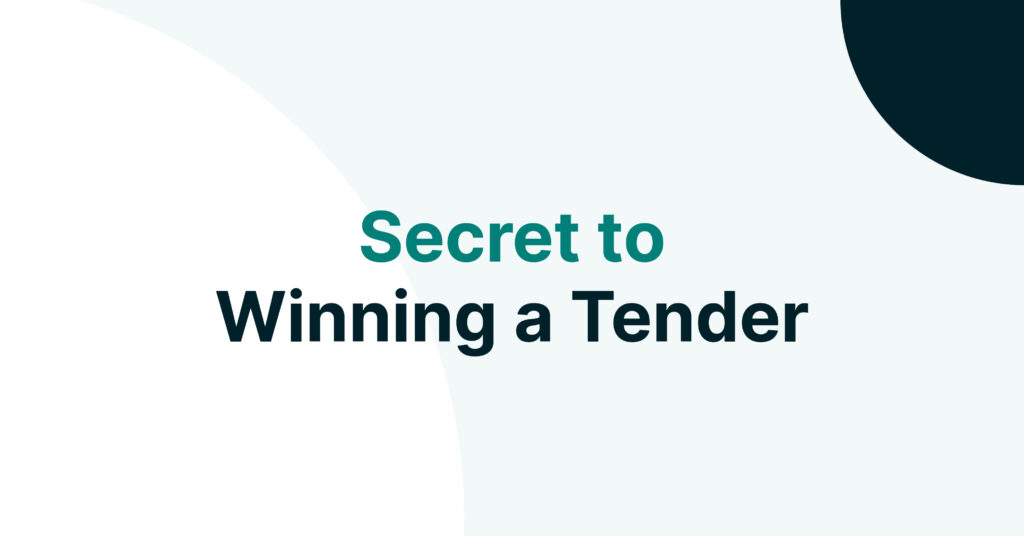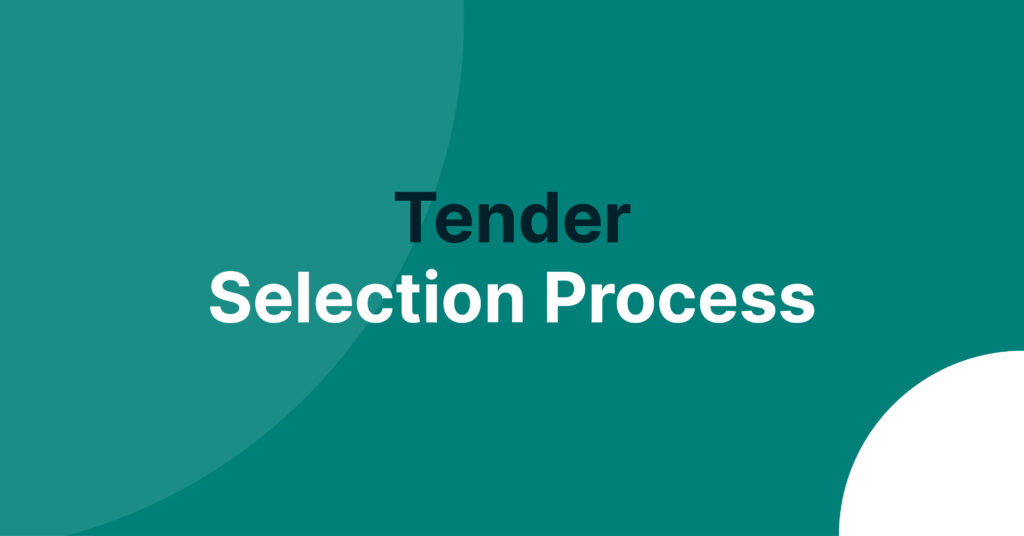13 things you should know about tendering
The complete guide to answering ‘what is a tender?’
Are you asking yourself what is a tender?
If you are sitting there puzzled wondering what is a tender, we can help you out. The word ‘tender’ might mean nothing to you now. By the end of this blog, you will be all too familiar with tenders. We have put together this guide covering everything you need to know about tendering.
1. What is a tender?
An invitation to tender (ITT) document is a written request sent out to potential suppliers. The invitation requires information the buyers need to assess and choose a preferred supplier. This is who they want to award the contract to.
A public sector contract is also known as a ‘tender’. The procurement process can sometimes be referred to as ‘tendering’.
If a business tenders for a contract it means a bid has been submitted for a specific tender.
2. How tendering works
Now we know the answer to ‘what is a tender?’, how does tendering actually work?
Let’s break down the process from the buyer’s perspective, they:
- Develop a specification of work they need.
- Set out supplier requirements such as mandatory accreditations, experience or economical and financial threshold.
- Develop a set of quality questions to be answered by suppliers as part of the tender response.
- Instruct how the bid should be formatted or submitted.
- Create the evaluation criteria. For example, the percentage what you will be scored for quality and price.
- Choose the contract type (single supplier, DPS or framework).
- Agree the tender procurement process – a Pre-Qualification Questionnaire (PPQ) or Selection Questionnaire, site visits, ITT submission, presentation and contract award.
3. What is a tender document?
A tender document is created at the beginning stages of the procurement process. The document is created by the buyer and details the requirements and expectations of the bid. The tender document will include details of selection and award criteria. These are things the buyer will be looking for when evaluating supplier’s tender responses.
By now, you should be developing your understanding of ‘what is a tender?’. However, we still have more to go through.
Some basic terminology to help you gain more knowledge of tendering are:
- Bid Management – the process of managing a tender submission for a contract and managing a bid team.
- Common Procurement Vocabulary codes (CPV) – Codes used by the public sector to categorise products or services.
- Dynamic Purchasing System (DPS) – Similar to an electronic framework agreement. The two differences are that suppliers can join at any time and it can be run as an electronic process.
- E-procurement – Electronic methods of the purchasing process.
- Evaluation criteria – how tender responses are marked.
- Framework agreement – an agreement between one or more businesses or organisations. If you enter the framework agreement you will be one of the suppliers who will deliver the contract.
- Initial Expression of interest (IEO) – Suppliers interested in bidding are invited to express their interest.
- PQQ – a questionnaire asking for specific company details. It will want to know insurance details or similar contracts you’ve delivered in the past. This can also be referred to as a Request for Information (RFI).
- Request for Proposal (RFP) – can range from a simple to a complex proposal. A Request for Quotation (RFQ) is similar to this.
- Selection Questionnaire (SQ) – A set of questions created to help buyers shortlist the most appropriate bidders to invite to tender.
We’ve covered all the basics to help you answer ‘what is a tender?’. However, there is still much more to know.
4. Types of tendering
There are multiple tendering types out there. The more commonly used ones include:
- Open tendering – This involves inviting submissions from the open market.
- Public sector tenders – Most tendering opportunities are published by public sector departments. This is because publicly funded authorities must spend their money fairly and wisely.
An example of a public sector tender is:
Contract: Implementation of a Community Engagement Website – Hart District Council
Buyer: Hart District Council
Value: £20,000
- Private sector tenders – Organisations that are privately owned can also publish tendering opportunities to outsource goods/services. They don’t follow the same regulations as the public sector.
The final thing to cover in our ‘what is a tender’ guide, is tips for success when bidding on contracts.
5. Is your business tender ready?
First thing’s first, is your business ready to take on a bid? Review the position of your business and your strategies to assess if tendering is the right approach. Once you have worked out your strengths and weaknesses you can decide if now is the right time to tender. You don’t want to waste valuable time and money.
6. Take the time to learn the terminology
As we’ve mentioned above there is a lot of terminology when it comes to tendering. It is worth familiarising yourself with all the terms as they’ll crop up a lot. The more you see them used in tenders the more you will understand them.
7. Focus on what the buyer wants
Not everyone is capable of writing engaging and concise copy that can be read clearly. It’s easier talking about what you can do. But when it comes down to writing a professional response it may seem tricky. You need to make sure your response meets the criteria.
8. 3 things to remember to help you write your bid are:
- What have you done previously and what are you going to do?
- What was your methodology? How will you use it this time?
- Evidence is key. You need to back up what you’re saying with evidence.
9. Research
You should do as much research on the buyer as you can. The more you know about them, the better. You need to demonstrate you understand the buyer’s requirements. Show case studies of similar work you’ve completed in the past
10. Pricing
You will need to include a quote for your work on the contract. To do this accurately, you need to consider a number of elements, one of which is your time. When estimating the timescale, consider things such as the time to carry out the work, meetings and travelling.
11. Check over your bid
We can’t stress enough the importance of proofreading. Check your work and check again. You don’t want to submit a bid that is full of spelling mistakes or grammatical errors. It looks unprofessional and you will lose marks. Ask someone else to read over your bid as they may pick up mistakes you have missed. Make sure your response flows well and is easy to read. Make sure you have checked and followed the submission guidelines.
12. Use your feedback
Feedback is important, especially if you lost the bid. It is worth knowing why you were unsuccessful on the bid. Knowing where you missed out on marks can help you improve for next time. Some reasons you may have lost your bid include:
- Bidding for the wrong contracts – Be selective about which contracts you tender for.
- Lack of evidence – You are not providing evidence to back up what you are saying.
- Lack of proofreading – Your answer was full of bad spelling and grammatical errors.
- Reusing your old tender – Buyers know when you’re sending them generic copy and paste text.
- Too focused on your business – It’s about what you can do for the buyer.
We’ve shared with you all there is to know on tendering. You should now be able to answer the question ‘what is a tender?’. If you’re looking for further tendering information, take a look at our masterclasses.
13. Need help with an immanent bid?
Tender Writing
Once you’ve found the perfect contract for your business, why not send it our way? Our Bid Writers can take care of it all for you. They’ll let you know what they need from you, providing you with a full Tender Writing breakdown. They’ll even submit it on your behalf.
Tender Mentor
If you’ve written your own tender response and need someone to double-check it for errors, Tender Mentor can help. The Bid Team will proofread your work for any inconsistencies, grammar or spelling mistakes. They’ll also ensure that it’s in line with the specification before you submit.
Tender Ready
Our Tender Ready 4-week programme is perfect for businesses that have never tendered before. A Bid Writer will work with you to make sure you have everything in place to tender successfully. Tender Ready offers your business:
- A 12-month subscription to one Hudson Discover portal.
- Access to Global Bid Directors and Senior Bidding Professionals.
- An Organisation-wide Bid library, including 3 case studies, 5 CVs and 8 policies.
- Additional flexible benefit options.
Tender Improvement
If you’ve been tendering but aren’t seeing the results you want, our Tender Improvement package can help. Our Bid Team will assess your previous responses and tender documents, working with you to improve for future submissions.
Find the perfect tendering opportunity with Discover Elite
Upgrading to Discover Elite can help optimise your tendering efforts – even when you’re busy. Our two new time-saving tools can improve your competitor awareness and success rate when tendering.








